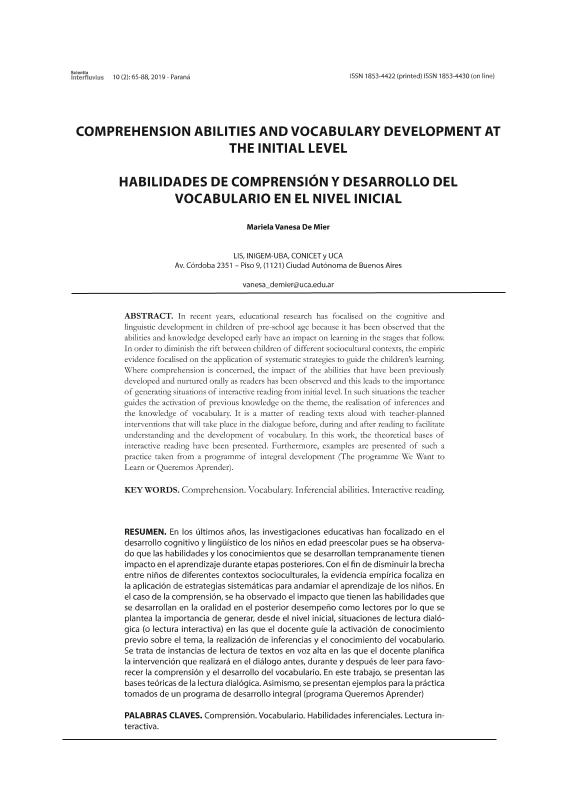Artículo
En los últimos años, las investigaciones educativas han focalizado en el desarrollo cognitivo y lingüístico de los niños en edad preescolar pues se ha observa- do que las habilidades y los conocimientos que se desarrollan tempranamente tienen impacto en el aprendizaje durante etapas posteriores. Con el fin de disminuir la brecha entre niños de diferentes contextos socioculturales, la evidencia empírica focaliza en la aplicación de estrategias sistemáticas para andamiar el aprendizaje de los niños. En el caso de la comprensión, se ha observado el impacto que tienen las habilidades que se desarrollan en la oralidad en el posterior desempeño como lectores por lo que se plantea la importancia de generar, desde el nivel inicial, situaciones de lectura dialó- gica (o lectura interactiva) en las que el docente guíe la activación de conocimiento previo sobre el tema, la realización de inferencias y el conocimiento del vocabulario. Se trata de instancias de lectura de textos en voz alta en las que el docente planifica la intervención que realizará en el diálogo antes, durante y después de leer para favo- recer la comprensión y el desarrollo del vocabulario. En este trabajo, se presentan las bases teóricas de la lectura dialógica. Asimismo, se presentan ejemplos para la práctica tomados de un programa de desarrollo integral (programa Queremos Aprender). In recent years, educational research has focalised on the cognitive and linguistic development in children of pre-school age because it has been observed that the abilities and knowledge developed early have an impact on learning in the stages that follow. In order to diminish the rift between children of different sociocultural contexts, the empiric evidence focalised on the application of systematic strategies to guide the children’s learning. Where comprehension is concerned, the impact of the abilities that have been previously developed and nurtured orally as readers has been observed and this leads to the importance of generating situations of interactive reading from initial level. In such situations the teacher guides the activation of previous knowledge on the theme, the realisation of inferences and the knowledge of vocabulary. It is a matter of reading texts aloud with teacher-planned interventions that will take place in the dialogue before, during and after reading to facilitate understanding and the development of vocabulary. In this work, the theoretical bases of interactive reading have been presented. Furthermore, examples are presented of such a practice taken from a programme of integral development (The programme We Want to Learn or Queremos Aprender).
Comprehension abilities and vocabulary development at the initial level
Título:
Habilidades de comprensión y desarrollo del vocabulario en el nivel inicial
Fecha de publicación:
04/2020
Editorial:
Universidad Autónoma de Entre Ríos
Revista:
Scientia Interfluvius
ISSN:
1853-4422
e-ISSN:
1853-4430
Idioma:
Inglés
Tipo de recurso:
Artículo publicado
Clasificación temática:
Resumen
Palabras clave:
Comprensión
,
Vocabulario
,
Inferencias
,
Lectura interactiva
Archivos asociados
Licencia
Identificadores
Colecciones
Articulos(INIGEM)
Articulos de INSTITUTO DE INMUNOLOGIA, GENETICA Y METABOLISMO
Articulos de INSTITUTO DE INMUNOLOGIA, GENETICA Y METABOLISMO
Citación
de Mier, Mariela Vanesa; Comprehension abilities and vocabulary development at the initial level; Universidad Autónoma de Entre Ríos; Scientia Interfluvius; 10; 2; 4-2020; 65-88
Compartir




